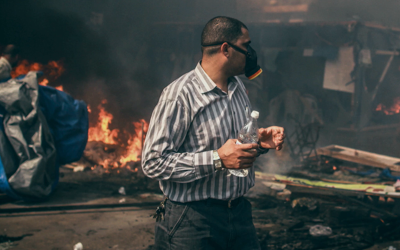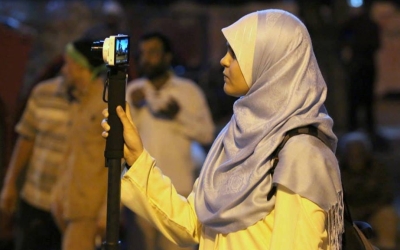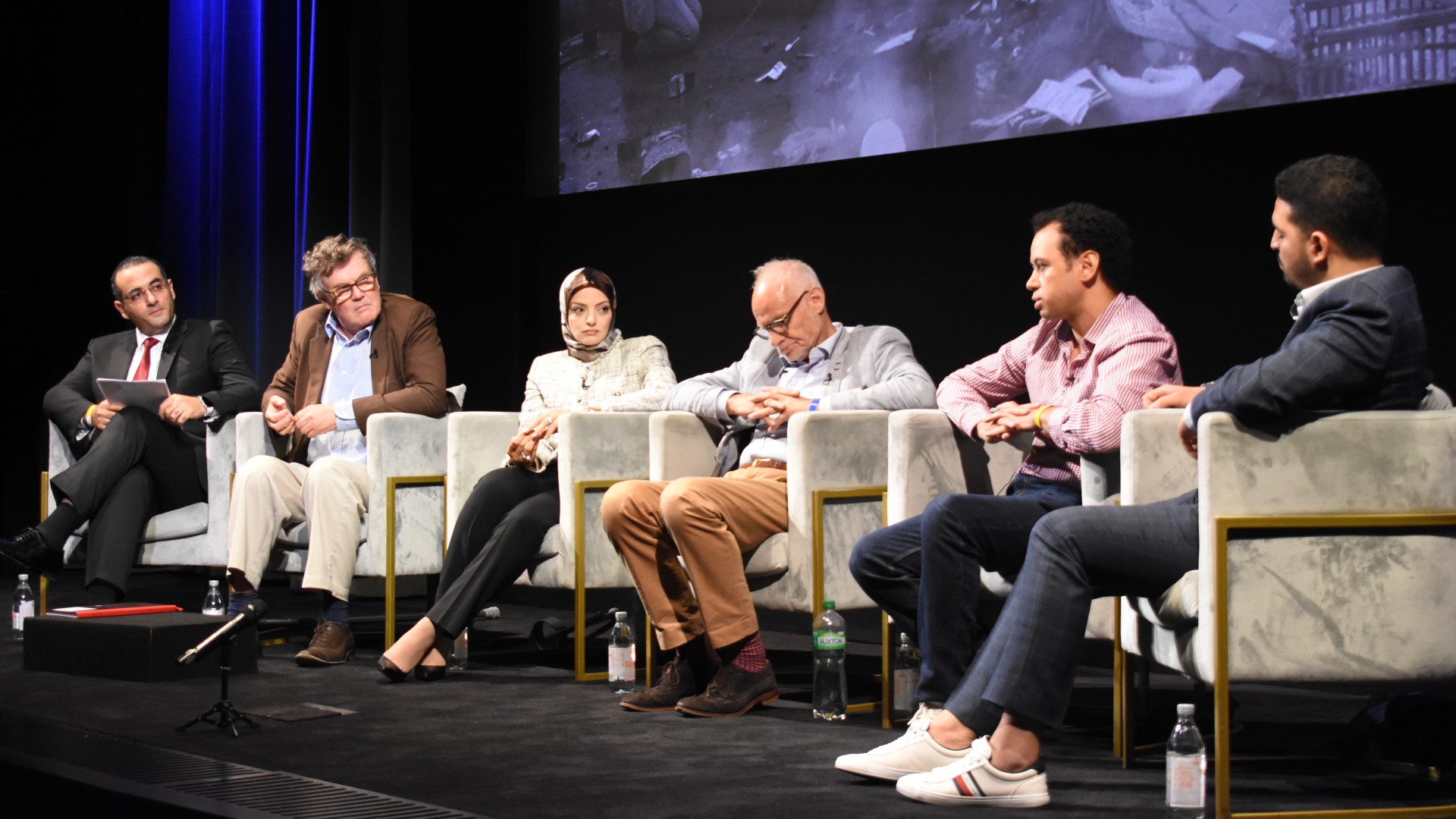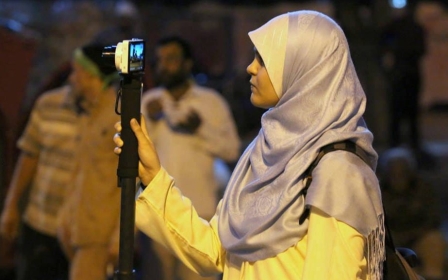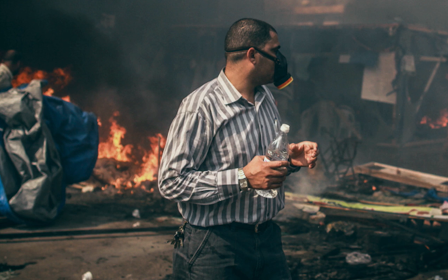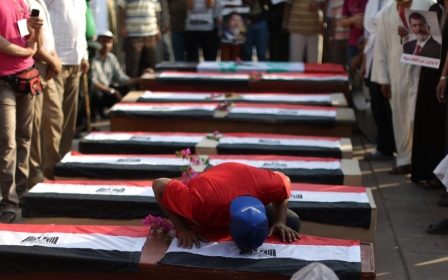Memories of a Massacre: Documentary on Egypt's Rabaa crackdown premieres at Bafta
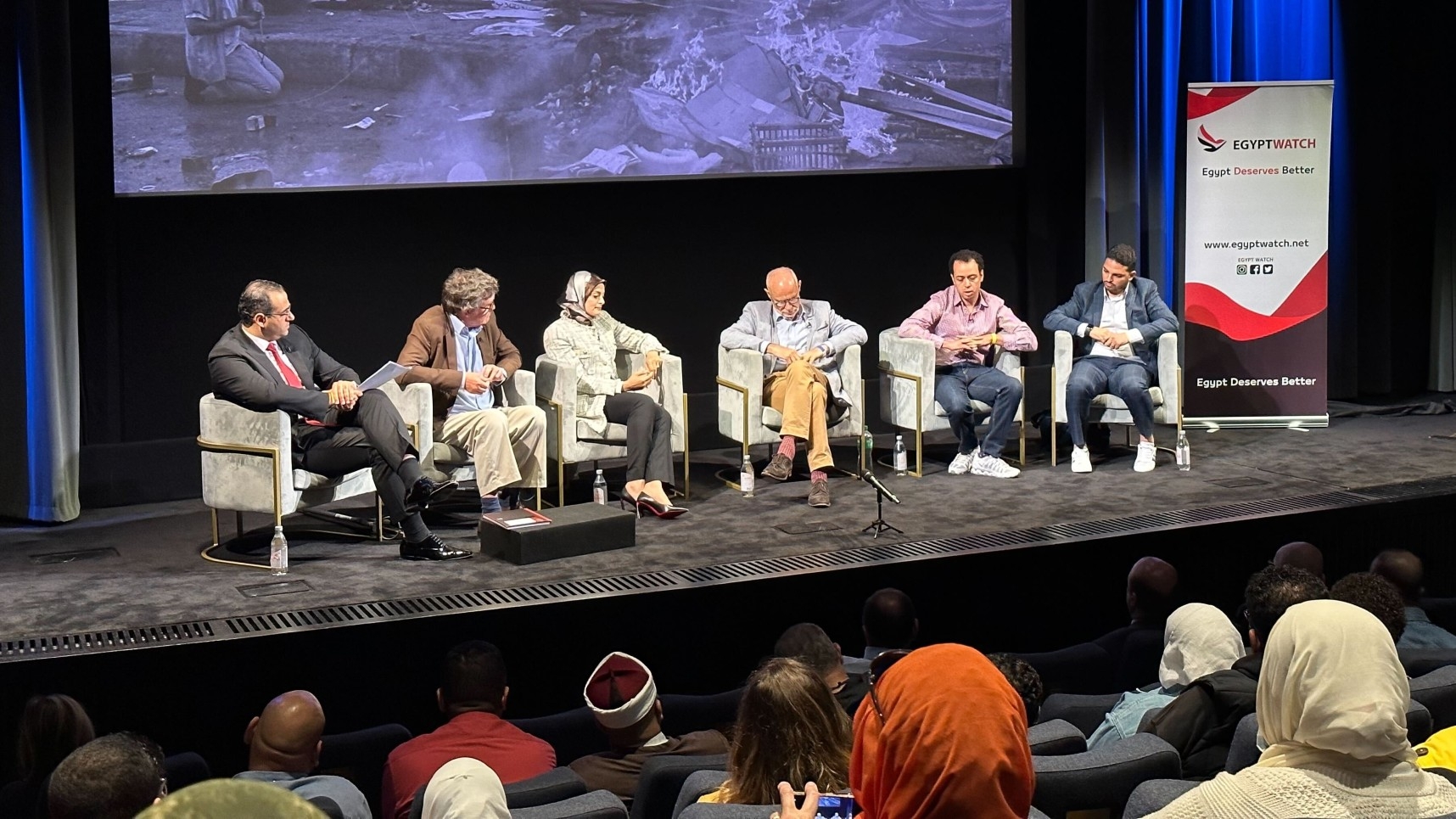
A documentary chronicling the killing of hundreds of Egyptian protesters at Cairo's Rabaa al-Adawiya Square following the 2013 coup that swept Abdel Fattah el-Sisi to power, aired at the British Academy of Film and Television Arts (Bafta) on Thursday to much acclaim.
The screening of Nicky Bolster's Memories of a Massacre was accompanied by a panel discussion featuring activists, journalists and eyewitnesses including Middle East Eye reporter Khaled Shalaby.
"It was clear that the plan from the beginning was that they would kill everyone," said Shalaby, an eyewitness to the massacre.
The film's unflinching portrayal of the mass killing, which left at least 900 people dead drew emotive responses from the audience members.
Tensions flared however, as pro-Sisi supporters, who numbered less than five but had leafleted the audience with flyers, had to be ejected from the screening.
New MEE newsletter: Jerusalem Dispatch
Sign up to get the latest insights and analysis on Israel-Palestine, alongside Turkey Unpacked and other MEE newsletters
In June 2013, following the coup that deposed Egypt's first democratically elected president, Mohamed Morsi, the Muslim Brotherhood and pro-democracy supporters staged a mass sit-in to demand his reinstatement.
According to Human Rights Watch (HRW), approximately 85,000 protesters joined the protests, which saw many live and sleep at the Rabaa and al-Nahda squares.
Eyewitness accounts attested to the peaceful nature of the protest, with many recalling the "magical" atmosphere at Tahrir Square in 2011 during the Arab Spring uprising.
But as time passed, supporters of the military grew frustrated and ordered the dispersal at Rabaa on 14 August, with armoured vehicles, bulldozers and hundreds of security forces moving in.
Over the next 24 hours, at least 900 protesters were killed, including women and children, according to HRW.
Planned massacre
Bolster's film opens with an image taken of a young man walking amid the smoking wreckage, a slingshot dangling from his hand. This was taken moments before the young man's death, the photographer said.
The massacre was one of the most visually documented atrocities in modern history. Security forces opened fire in broad daylight.
Much of that footage is documented in the film; along with testimonies from survivors, and an array of talking heads which includes former Obama administration official Ben Rhodes, New York Times correspondent David Kirkpatrick and former HRW head in the region Sarah Leah Whitson.
'The plan was not just to disperse the protests, but to actually punish people and to make an example'
- Amr Magdi, HRW
Years later, a report by HRW found evidence that authorities had planned the mass killing. The film's footage attests to this, with images of carefully positioned snipers lining the tops of buildings around the square and helicopters firing from overhead.
Looped pre-recorded warnings about the imminent dispersal were played through loudspeakers only moments before the attack. The first warning for many was the firing of live ammunition.
"I was there," said Osama Gaweesh, the editor-in-chief at Egypt-watch in his introduction to the film.
"I cannot forget the horrible sound of the sirens. I still remember the frightening voice [telling the protesters to disperse]. I have been hearing this voice for many years."
The calculated brutality contrasts with the humanity of the protesters: the footage of 17-year-old Asmaa el-Beltagy's final moments on a hospital floor; the young woman forced to look through piles of bodies to find her brother; and cameraman Mick Deane's final plaintive words, "I've been shot".
Language of genocide
But the film is not just a document of the massacre. It also charts the death of Egyptian democracy, and the shattering of the dreams that were forged in Tahrir Square in the weeks before and after the fall of longtime autocrat Hosni Mubarak.
In Bolster's narrative, Rabaa marks the abrupt end to those dreams. Amid the euphoria in the aftermath of the 25 January 2011 uprising against Mubarak, the Muslim Brotherhood prepared for Egypt's first democratic election.
Morsi, their preferred candidate, became the country's first elected leader.
But despite this, the country was still in the grip of the military. Morsi's rule was plagued by fuel shortages and power cuts and police disappearances from the streets. Once Morsi was deposed, these problems miraculously disappeared.
The film's narration alludes to the role of the "deep state" in engineering the shortages and power outtages.
In June 2013, Morsi was ousted by Sisi, who at the time was serving as defence minister. The months following the coup were marked by protests and sit-ins; but the massacre at Rabaa eradicated the last vestiges of the revolution.
The film includes newsreel footage from public campaigns against the sit-in, with protesters referred to as "cockroaches" who must be "crushed".
"This language was used in Rwanda, in Srebrenica, in the Holocaust, in Cambodia… this was a genocide," Dalia Fahmy, associate professor of political science at Long Island University, said during the panel discussion.
Tinderbox
Bolster highlights the role of inaction by international actors in the cementing of Sisi's power, allowing the impunity that he exercised in Rabaa to define his rule, which has since seen an estimated 65,000 languish behind bars.
"I think the plan was not just to disperse the protests, but to actually punish people and to make an example," Amr Magdi, a researcher at HRW, said during the panel discussion.
"And what happens next, in the following weeks and months and years is actually the worst experience of authoritarianism."
Most revealing are the recollections of Rhodes, who admits that Sisi knew the US would not intervene folowing the coup.
"It was one of the most disappointing, depressing, angering experiences because we as a government had made the decision that we weren't going to push back against the fact of this coup. And now we're seeing the most acute consequences of it," he recalled in the documentary.
According to Fahmy, for the US administration, "stability" in Egypt meant "increased repression" for its people.
"But there’s a breaking point," she said. "The biggest gift of the revolution was that the fear barriers were broken."
"[The US was] going to accept authoritarianism because that's where they were going to get stability from," Fahmy said, adding that "Egypt is a tinderbox... my fear is that the next cycle of change might not be so peaceful".
Middle East Eye delivers independent and unrivalled coverage and analysis of the Middle East, North Africa and beyond. To learn more about republishing this content and the associated fees, please fill out this form. More about MEE can be found here.


